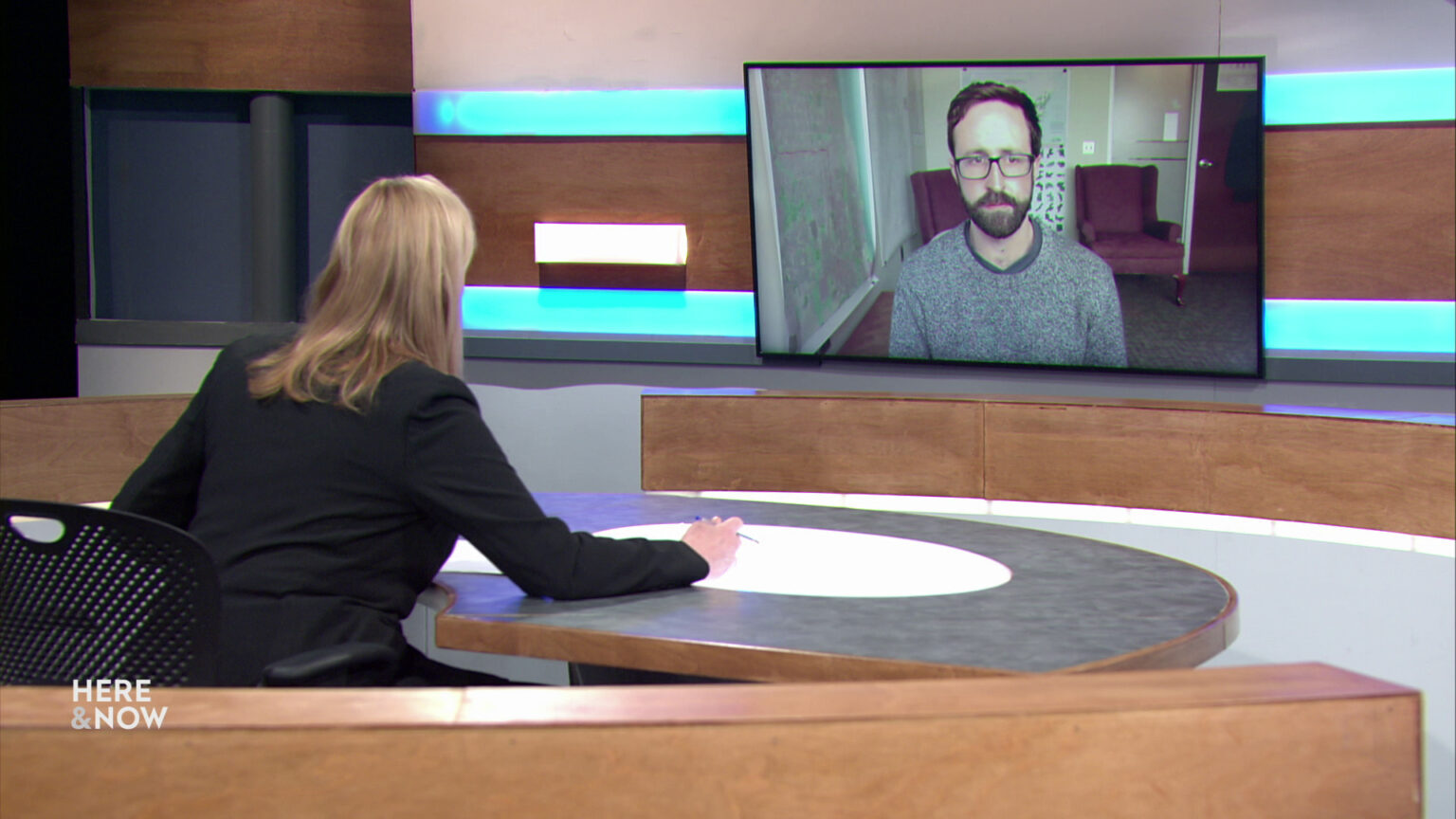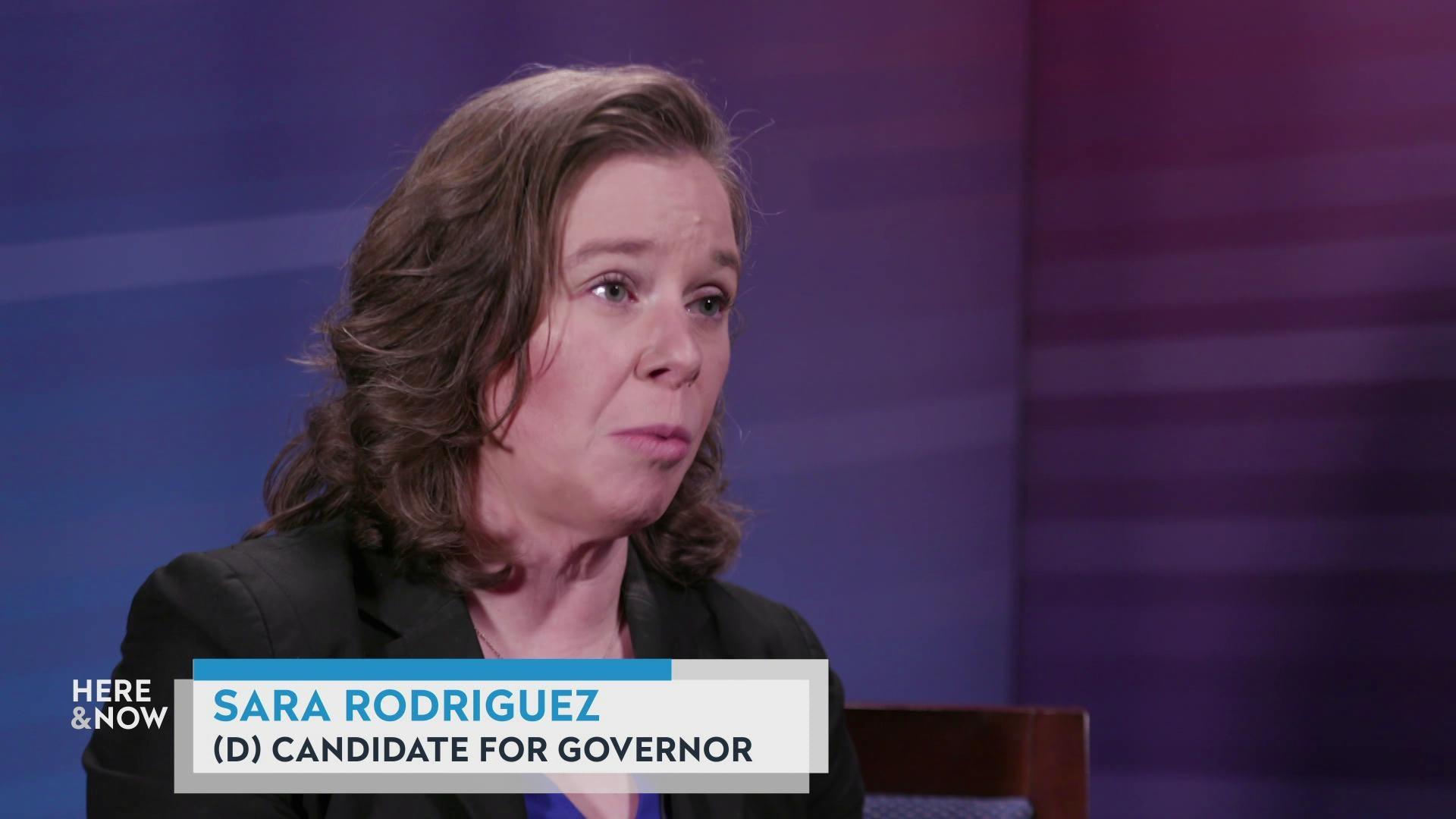'Here & Now' Highlights: John D. Johnson, Zac Schultz, Carrie Poser, Chelsea Chandler
Here's what guests on the Jan. 19, 2024 episode said about legislative redistricting proposals, factors that play out alongside district map effects in elections, the state's rising homelessness rates, and legislation to bolster EV charging infrastructure.
By Frederica Freyberg | Here & Now
January 22, 2024

Frederica Freyberg and John D. Johnson (Credit: PBS Wisconsin)
None of the newly drawn legislative district voting maps submitted under the Wisconsin Supreme Court criteria are a clear choice, explained Marquette Law School researcher John D. Johnson. Here & Now journalist Zac Schultz discussed factors other than new maps that will impact the 2024 elections for state lawmakers. Bipartisan bills making their way through the Legislature would harness nearly $80 million in federal funds to build out electric vehicle charging stations across Wisconsin – a welcome development, said Clean Wisconsin’s Chelsea Chandler. Growing homelessness across the state stands out in the midst of bitterly cold weather, and Carrie Poser of the Wisconsin Balance of Continuum of Care said the number of people who lack shelter of any kind is the worst she’s seen.
John D. Johnson
Research fellow, Marquette University Law School
- Most of the seven legislative redistricting maps submitted in response to a Wisconsin Supreme Court order meet the state’s minimum constitutional requirements for voting districts – criteria like contiguity and equal populations — along with the terms set by the liberal majority in its decision. The high court will have to make judgment calls about which aspects of these proposals they value most, Johnson said.
- Johnson: “I think the most important criteria is equal populations. That’s the whole point — why we do redistricting. All of the plans have a population deviation of less than 2%, so I could imagine the justices simply deciding that all of them were equally good on that metric. On the other hand, some of the plans have deviations closer to 1% and some are closer to 2 — lower is better on this metric. So we could also imagine the justices saying, ‘well, we really prefer a plan to have the least population deviation, the most equal populations possible.’ The other, sort of pass-fail is contiguity, which these plans all set out to achieve.”
Zac Schulz
Senior political reporter, Here & Now
- Assembly Speaker Robin Vos has said it’s not the maps that result in Republican majorities in the Legislature – it’s that the party has better candidates. Schultz offered context to that claim.
- Schultz: “When Robin Vos says that, what he’s referring to is in 2018 with Tammy Baldwin’s U.S. Senate run, in 2022 with Governor Evers’ reelection, they each won at the top of the ticket. A number of Assembly districts, and enough that the Democrats would have had the majority in the Assembly if all of their down-ballot Democrats had won their races. He says that proves that down-ballot Republicans win on their messaging. But there’s also the factor that in Wisconsin split-ticket voters exist, and they do separate out their feelings on who should be a U.S. senator or a governor and who should run for Assembly. So there is truth in what he is saying, but a different district makeup will affect that as well.”
Carrie Poser
Director, Wisconsin Balance of State Continuum of of Care
- While strides were made to help the unhoused during the pandemic using federal funds, that money is now drying up and homelessness is once again on the rise in Wisconsin. At the same time, there is a Republican proposal in the Legislature that would crack down on where people can camp outside to live. A count conducted in January 2023 shows nearly 5,000 people counted among the unhoused, including nearly 500 with no shelter at all. It’s the highest number since 2012, according to the Wisconsin Department of Administration, which says the problem is only growing. Poser responded to proposed legislation to criminalize camping outside except in government-approved sites.
- Poser: “It’s coming up in states all across the country. Unfortunately, it perpetuates a false and often harmful narrative as to the causes of homelessness, along with the potential solutions, rounding people up and putting them in a place established by a city or state, and making it a crime to be anywhere else does not end homelessness. Oftentimes it’s counterproductive. It’s expensive, it’s harmful, and it’s dehumanizing. If the purpose of those bills is to address is to truly address the unsheltered homeless uptick in the state, then we need investment in a variety of different things, including crisis housing, shelters, outreach, engagement, landlord incentives – to get landlords to agree to work with our programs and the people we’re trying to serve. Rounding people up isn’t the answer.”
Chelsea Chandler
Climate, Energy & Air Program Director, Clean Wisconsin
- The state Senate on Jan. 17 passed two bills designed to jump start the construction of electric vehicle charging stations across Wisconsin by tapping into nearly $80 million in federal funds. The measures go next to the Assembly. A change in law is required to allow gas stations like Kwik Trip or other businesses to charge 3-cents per kilowatt hour to charge up, because current law only allows public utilities to charge for electricity. Chandler described why the bill is getting support from an environmental perspective.
- Chandler: “These bills are really important for unlocking $78 million in federal funding made possible by the Biden administration’s infrastructure law. It’s part of the National Electric Vehicle Infrastructure Program. …Right now, Wisconsin is one of only two states in the country that is having people pay by the amount of time that they’re charging their vehicles, instead of the amount of energy that they’re using in kilowatt hours. If you’re charging your gas car at the pump, you wouldn’t pay for the amount of time you’re sitting there. …The intent is just for a company to be able to provide a service to car owners who want to power their vehicles.”
Watch new episodes of Here & Now at 7:30 p.m. on Fridays.
 Passport
Passport











Follow Us